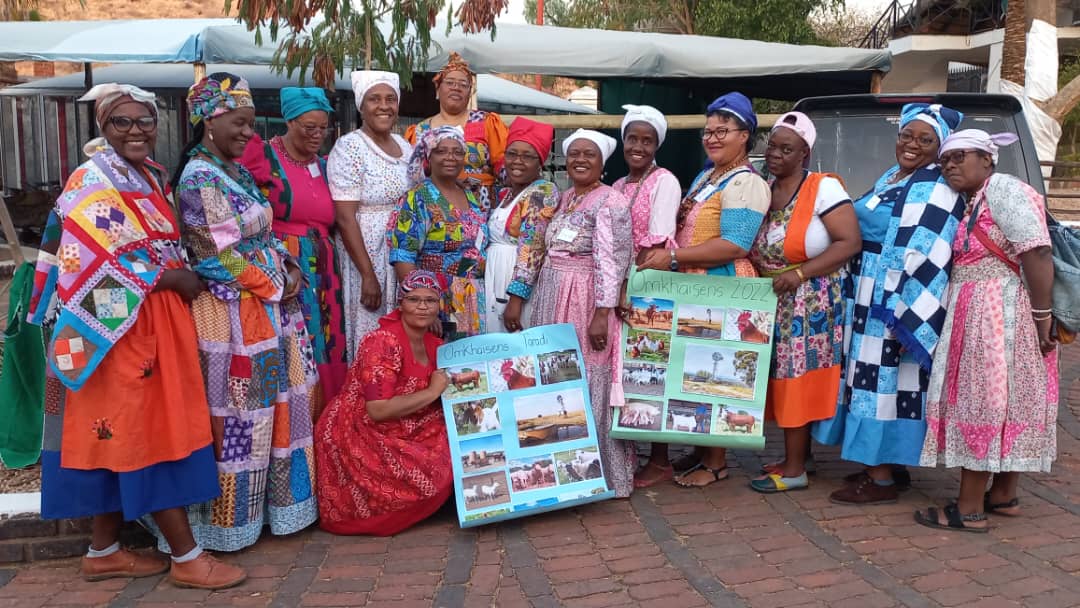BRAKWATER - High rent fees, stock theft, water scarcity, crowded communal areas and expensive land are among the factors holding back female farmers from prospering in their farming.
Around 15 female farmers met recently on the outskirts of Windhoek to empower each other through knowledge sharing as they strive to improve their farming practices. They tackled various aspects of farming such as animal health, and finances as they looked at different farming methods. The group comprised those involved in crop farming and animal husbandry (cattle, sheep, goats, pigs, and poultry).
Meeting under the theme ‘When a woman is empowered, the family is empowered and when a family is empowered, the nation is empowered’, the group who calls themselves Omkhâisens Taradi shared information and had guest speakers who took them through the sessions. “The programme was very short and dense, the facilitators and the guest speakers knew what the group expected, and knowledge gained was precise,” Adelma Damases said.
Damases, together with her husband John, farm at Okorusu number 88 in the Otjiwarongo district with goats, sheep, cattle, and poultry. However, they are also maize and grass cultivators, producing animal feed on a large scale.
“The government has also taken us in through the Namsip programme as seed producers of Namibia,” she said.
Last year, the Damaseb couple helped drought-stricken Kunene and Erongo farmers with a donation of 1 200 grass bales. They also successfully hosted a farmers’ day for around 90 farmers from the Visionary Farmers group.
Another participant, Roswitha Brendell, a food scientist in training and the co-founder of Wellance Lifestyle Investment cc based a few kilometres outside Windhoek, strives to develop safe and nutritious food products in order to enhance and promote the food processing industry in Namibia.
On their plot, the Brendells focus on quality food production and research of cost-effective processing methods.
“We have a research garden at Breakwater, where we are experimenting on natural ways of planting different products and using companion planting methods with herbs and vegetables. We are also selling herb seedlings and plants in order to fund our research.” “Currently, we do have strawberry seedlings and plants and other herb seedlings. Apart from crop farming, we are also farming with goats and sheep at our family farm, Tuxab East,” Brendell said.
Both Damases and Brendell shared their experiences with the group while they also learned from others.
During one of the sessions, Brendell introduced companion gardening, soil preparation, and usage of herbs like lemongrass, basil, rosemary, and borage to the workshop, and the fact that the participants could feel and taste the herbs enlightened awareness.
“My take-home message from the weekend was the information on pig farming. The weekend bred interest in pig farming, such that I made it my personal goal to do a bit more research and venture into it,” she said.
Thusnelde Timbo farms full-time at Springbokfontein Pos 1 near Tubusis outside Usakos.
Timbo is engaged in goat, pig, and layer chicken farming. In the future, she intends to also farm with sheep and crops.
During the sessions, she realised the importance of planning and investing in quality goats and sheep as well as expanding her crop farming and moving her farming to a business level.
Retired educationalist Monica /Gawises said she learned a lot at the gathering.
“I grew up in Walvis Bay and was absolutely not interested in farming and all along left farming in the hands of my husband. This platform triggered my interest in farming, in particular crop farming,” she said.
The group was started through a WhatsApp platform by retired nurse Elizabeth Doeses and comprises around 50 female members from eight regions of Namibia.
The majority of the group members are upcoming farmers who still need guidance.
Their meeting identified various challenges like high rent fees, water problems and expensive land as stumbling blocks in their drive to feed the nation.


